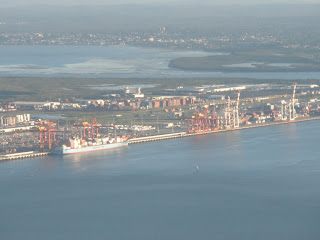Zero population growth
Zero economic growth
Zero waste
Zero carbon emissions.
How difficult it is to choose only one of the above to dip in to for the last letter of the alphabet. There's so much left to blog about, so much left unsaid. I began back at the beginning on the month looking at the power vested interests, the media and the advertising industry have over our perceptions and understanding of climate change. I've dipped into different aspects of this immensely complex and challenging subject with each subsequent letter of the alphabet.
Here we are at the end of the month, and not much has changed; forests are being felled. Creatures are being made extinct. Lands are being eroded. Arable land is being mined at an alarming pace. People are dying from climate related issues; lack of clean drinking water, malnutrition, flooding and drought. Australia is as tardy as ever in tackling the issue proactively, creatively and with courage, commitment and vision. Our politicians seem to prefer the "business as usual" scenario; "Let's not rock the boat, people might get a bit agitated when they understand the mess we've created and allowed to continue".
But there's one thing that could happen, relatively easily and economically that would make what is a potentially disastrous situation just a little better.
Zero population growth.
It took around 200,000 years for the population on Earth to get to 1 billion, but only just over another 200 years for it to reach 7 billion. An astounding 6 billion people were born in 200 years. That’s incredible! It’s the greatest population the world has ever known, and it brings with it challenges never before imagined or experienced.
 |
| China tackled the issue of overpopulation with determination and an awareness that to ignore the problem would be disastrous. |
Our changing climate with new patterns of drought, flood and storms is going to take some getting used to. Our habit of relying on easily accessible, cheap fossil fuels for energy will need to be addressed. Ideally this will be done creatively, proactively and without malice or obstruction from those with a vested interest in maintaining the status quo of an addiction past its use-by date.
Companies are made up of individuals. Individuals have choices. Companies have choices. My dream is that every employee in every company around the world looks at the impact of their current policies with seeing eyes. That they raise their voices if there is coercion, bullying, unethical, cruel, inhumane or immoral behaviour. My nightmare is that they don’t have the ability to do this, and that our children, grand children and great grandchildren will suffer horribly as a result. The worst case scenario is that current policies and actions could lead to the final zero for humankind.
To honestly and courageously face these challenges will take vision, wisdom and the creativity and collaboration of peoples from all walks of life from all countries in the world. This is not a time for bullying, coercive tactics, manipulation and lying.
Both genders should be involved. At present, women are too often silenced by groups intent of maintaining their own power and the subservience of women. One way this is achieved is to deny women access to adequate, modern methods of birth control. “Barefoot, pregnant and in the kitchen” is the reality for billions of women worldwide. Or perhaps more accurate is “barefoot, underaged, uneducated, pregnant and malnourished”. It's an insidious way to keep much of the world's population silent and compliant.
Few of us would choose to be born into poverty, into lands where food and water supplies are intermittent, where death in childbirth is common, where girls are taken as brides when they’re still children themselves and where education is a dimly heard of luxury.
However, unless we address the issue of our Earth’s rapidly increasing population and assist it to drop to near zero, poverty, disease and malnourishment will be commonplace. More mouths to feed means more crops to be grown on less arable land, (see D - Desertification here). There will be more carbon emissions, if our energy and food (see E -Eat here) sources remain unchanged - and more garbage in general. (P - Pollution here).
Conversely, it’s been shown that population stabilisation has enormous benefits to all aspects of health in the communities where it is adopted. Women and girls, their family members their lands and food systems are healthier and more productive. There’s more food and water to go around, less stress on health services and infrastructure and equally importantly, arable land and fishing grounds are able to recover and become more productive.
Reducing birth rates eases the pressure we place on natural resources, food systems, water sources, biodiversity, forests and the atmosphere.
Contraception and sound family planning are vital components of the complex issues we face in the years ahead as we try to balance the population with what can be maintained by our Earth’s resources.
In a recent discussion, Naomi Oreskes said something along the lines of: Resistance to accepting there are challenges ahead is related to not liking the implications on political, social and economic levels. Climate change is rejected because it has consequences for how we live our lives and what it means for us. These changes will be very significant and require a complete transformation of the energy system. (Link here.)
If we aren’t proactive, and consider the repercussions of inaction in a calm, measured thoughtful way, we will be reacting as events unfold which is neither wise nor desirable.
Have we got the courage, wisdom and humility to face the future with eyes wide open or not?
Last year I wrote - A-Z "An incomplete journey of workplace bullying" for Z, here, and Zero here.



























